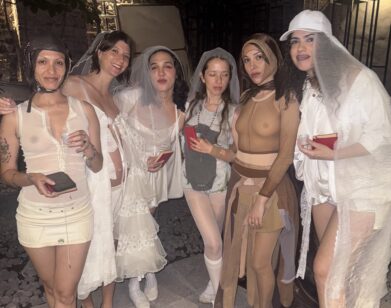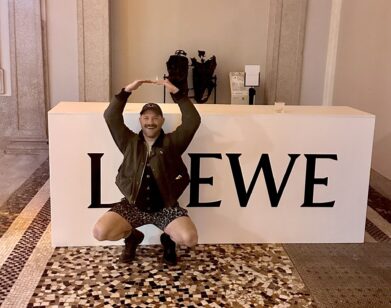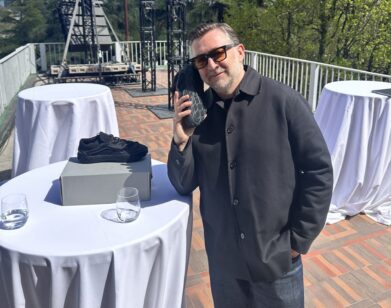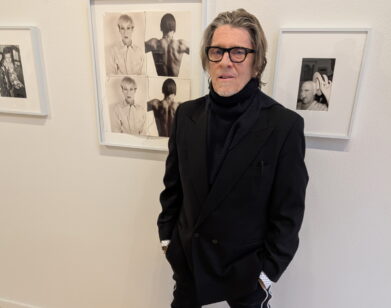Jen Doll’s Writing Engagements
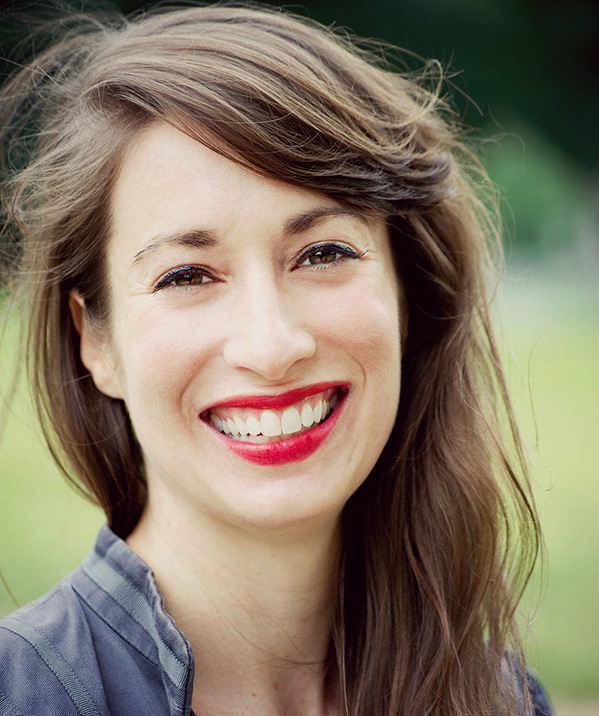
ABOVE: JEN DOLL. PHOTO COURTESY OF SARAH SHATZ
Once Hurricane Sandy finished teeming and gusting across New York City, writer Jen Doll told her mother she was safe and in the company of her boyfriend.
“I was so glad he was there, so you weren’t alone,” Doll’s mother replied. She wanted her daughter to marry, and this was her way of saying it.
For a long time, Doll also dreamed of marriage. Riding shotgun in her father’s car, she would blast a cassette of “Pachelbel’s Canon” and imagine herself with one of the heartthrobs who adorned her Tiger Beat and Bop magazine covers. She would wear the emerald ring with which her mother’s ex-husband proposed. She pictured herself in a flowy white dress, beside friends and family, at the center of the aisle.
But so far, Doll has attended each of 30-odd weddings as a guest instead. Her experience—which has included trekking to a Dominican Republic resort, nursing hangovers and sleeping in hotel rooms reeking of Marlboros, all for these ceremonies—has eased her fixation on getting married, while sparking her interest in matrimonial guesthood. Weddings, after all, are social occasions. At many of them, families reunite; friends reminisce; and strangers mingle, even flirt. Many guests, like brides and grooms, associate each wedding with memories of whom they were when the vows were read.
Enter Save the Date, Doll’s first book, which examines weddings from the lens of a recurrent guest. Doll, whose articles have appeared in The Village Voice, The Atlantic, and The New York Times Magazine, chronicles nuptials using her many personal anecdotes, a departure from her more journalistic fare. The result is a memoir that accompanies readers, whether they are preparing to attend a wedding or recollecting past ceremonies.
We shared a table with Doll inside a Greenwich Village coffee shop a few weeks ago. In between sips of our morning coffee, we discussed the book and the memories behind it.
HARRISON GOLDEN: You’re used to being on the other side of interviews. What’s it like being the one interviewed, as you promote your book?
JEN DOLL: It’s weird. I always feel like I’m going to say something awful and stupid, and sometimes I learn that I have. Also, when it comes to succinct, coherent thoughts, I’m more used to writing them than I am speaking them. To have this much focus, to keep talking to people this way is new to me.
GOLDEN: Without giving anything away—I know that’s difficult because you’ve written these 200 pages on it—how would you describe your book, in one sentence, to a stranger on the street?
DOLL: What I’ve been saying is that it’s a memoir about going to weddings, but that’s not a thoughtful description. My proper one would be: It’s a book about growing up as a woman in a particular time in which marriage is both this pervasive aspect of cultural life and also something we’re not sure we want to do or how we want to do it. That’s one sentence. Here’s a second sentence: It looks at our lives through the weddings we go to.
GOLDEN: How many weddings have you been to at this point?
DOLL: About 30, but I fear I might have forgotten about some. I have solid memories about the dozen or so weddings I write about in the book. I think there’s something about weddings that makes you freeze those memories in your mind. I was just at one last weekend, and the number keeps going up.
GOLDEN: At what point did you realize you could turn all of these memories and sentiments into a book?
DOLL: In October 2011, I decided to write four sentences about each of the weddings I had been to—what I remembered, the presents I have, stuff like that. I wrote it and didn’t do anything with it for a few months, because I thought maybe this could be a book. Because I’m a paranoid person, I thought someone else might take the idea. But then as I wrote more news stories for The Atlantic, I thought it would be nice to have something personal run again. I submitted it to The Hairpin, and they ran it in April, under the title “All the Weddings I Have Ever Been to, as I Remember Them.” When it ran, people commented, mostly with their own wedding stories. It seemed to resonate.
GOLDEN: When it comes to the rigor of writing and promoting a book, I’m sure your journalism career has helped you pace yourself.
DOLL: Absolutely. Everything I’ve done up to this point has helped me manage. Writing the book, I felt very mechanized to get it out. Without these career experiences, I’d probably be more wide-eyed and stressed out. But I’m already stressed out, so perhaps that eases things a little. Not much, but a bit. The kind of life experience that comes with having a lot of different jobs is very helpful when writing a memoir because you get more to fall back on.
GOLDEN: Did you ever write diaries that made recounting personal details easier?
DOLL: I started keeping a diary when I was eight. I can see it now: the cover has this kitten on it that’s cozied up with a mouse. It’s the cutest little thing. I wrote in that on and off until the time I graduated high school. It includes details about my first experience with alcohol, alongside other CliffsNotes of my life. In my memoir, I tried channeling the person I was then with the one I am now.
GOLDEN: It’s clearly a big decision to get married. But as you touch on, attending a wedding involves decisions, too, like the friends you keep. It involves way more people than those going down the aisle.
DOLL: These events are far more about friendship than we give credit for. Without wedding guests, the majority of weddings wouldn’t exist the way we want them to. Sometimes we lose perspective, and we don’t give our friends—or even the wedding couple—credit for being our good friends.
GOLDEN: Going back to your childhood, you moved around quite a bit. Texas, South Carolina, Illinois, South Carolina again, then Illinois again. Did that make you more wanting of the stability marriage can provide?
DOLL: I think it actually left the opposite effect. Moving around left me with a spread-out group of friends. I think this is partly why I’ve been to a lot of weddings. Knowing that I could move to different places and not feel like I lacked support systems helped me be on my own. I’ve become less worried about marriage, because I’ve experienced so many different places, and it’s been okay.
GOLDEN: You write in the book that you used to wear your mother’s engagement ring in high school. Do you still keep a collection of wedding-related items?
DOLL: Like a shrine?
GOLDEN: That might be a bit extreme, but just assorted items related to weddings.
DOLL: I have this purse, and it’s filled with tiny little clutches, which I usually take to weddings. Inside those, there are a bunch of place cards from past weddings. I was looking through them over the weekend: one from Table 14, one from Table 11. But that’s more about me being a sloppy person who doesn’t throw things away.
GOLDEN: As you get older and as times change, how much do you think weddings matter?
DOLL: Two people saying “I want to be with you forever” in front of everyone they know is still an awesome moment of love and accountability. That will still matter for most people, no matter how old they get or how different times become.
GOLDEN: Has your idea of family changed over the years?
DOLL: Living in New York City has certainly done that for me. I don’t go home to my family as much as I go out to spend time with friends who are like your family. There’s something really nice about that. My perspective of family, now more than ever, is that your family are the people you choose to surround yourself with, who treat you well and make you feel good about yourself.
GOLDEN: One moment that stuck out for me while reading the book was that you got a press pass to attend one of New York City’s first same-sex weddings, which Mayor Michael Bloomberg officiated between two of his staffers. That must have helped shape how you think this generation defines marriage and, in turn, family.
DOLL: It’s love acknowledged in a way previously not allowed. Even though many same-sex couples had families before they could legally marry, it matters to have people around them. That wedding made me feel like the world was growing up. It was how weddings should be.
GOLDEN: Throughout the book, there’s this recurring battle of wanting and not wanting to marry. Has writing the book helped solidify your thoughts?
DOLL: Certainly. The big shift has been that, at the age of eight, I definitely thought I would get married, and that now I’m not so sure. Now it just doesn’t seem to matter as much as loving relationships.
GOLDEN: There are plenty of myths regarding marriage. One is that it’s always great to be single at weddings. Why do you think that misconception exists?
DOLL: I think we have so many narratives in our head that we’re hoping are true at all times. Of course we all know about the woman who met her future husband at her friend’s wedding. We’ve seen them in romantic comedies. People want these to come true, but 99 percent of people go to weddings and that doesn’t happen.
GOLDEN: You can tell a lot about people by the way they approach being guests at weddings.
DOLL: It’s fascinating, isn’t it? Weddings are such an ideal example of how we work; they’re really staged. Even if you go to a wedding you think seems false, whatever it is has been chosen specifically, and it means something. We put forth symbols of meaning, and we expect people to interpret them the way we want them to. If aliens landed and looked back at our history of wedding behavior, they would probably think we’re weird.
GOLDEN: And yet as heady as those ideas seem, you write in such a conversational way.
DOLL: The way I wrote the book felt very natural for what it was. I mean, weddings are very conversational, too. They make for good conversation. We talk about them a lot.
GOLDEN: We’re talking about them right now, for instance! Do you want readers to feel like they’re conversing with you?
DOLL: I didn’t write this book as some proclamation from up high. I didn’t write with the idea that my wedding stories were the best. I simply wrote it using my experience and thoughts. I know they’ll have their own interpretations as well, so if this book creates a way for us to talk about weddings more, then that’s great.
GOLDEN: Any weddings coming up?
DOLL: Actually, my brother is getting married in September, and I am officiating the ceremony. You basically got ordained online, then make it official at a government clerk’s office. At least, I think. I’ve never gone through the process before.
GOLDEN: Whose idea was it for you to officiate?
DOLL: My brother and his fiancée asked me.
GOLDEN: Well, you seem to know enough about weddings. I’m sure you’re more than qualified.
DOLL: It’s a little nerve-racking, though. I’m imagining I’ll cry, but it’ll go well.
GOLDEN: Aside from your brother’s wedding, any others this spring or summer?
DOLL: Nothing planned yet. But who knows? Sometimes they pop up. Or maybe I’ll just stop being invited to any weddings because my book comes out and people will think I would write about them next.
SAVE THE DATE IS OUT TODAY VIA RIVERHEAD BOOKS.


